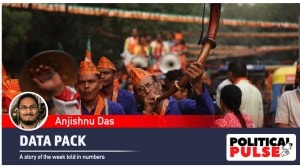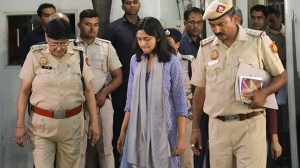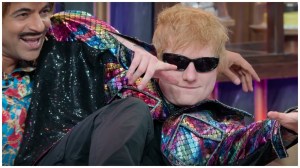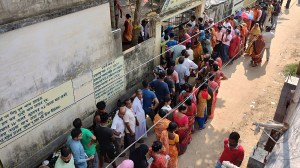- India
- International
Truth buried forever: Gujarat HC slams RTI activist Amit Jethwa’s murder probe
Jethwa was shot dead by two persons outside the Bar Council building, opposite the Gujarat High Court, in Ahmedabad on July 20, 2010. The assailants fled the spot, leaving behind a motorcycle and a country-made revolver.
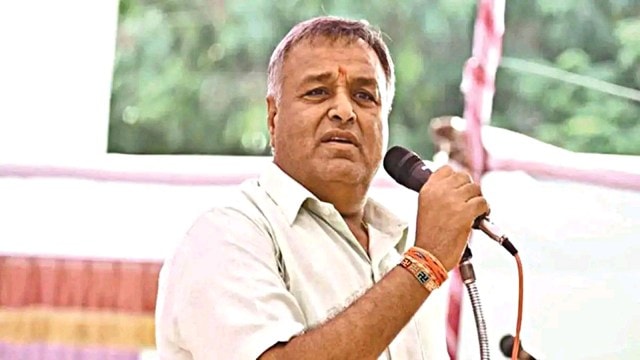 Gujarat High Court Monday acquitted former BJP MP Dinu Solanki and six others who had been sentenced to life imprisonment in July 2019.
Gujarat High Court Monday acquitted former BJP MP Dinu Solanki and six others who had been sentenced to life imprisonment in July 2019.Underlining that the investigation into the July 2010 murder of RTI activist Amit Jethwa appeared to be an “eyewash” and “all efforts” were made to ensure that the “truth is buried forever”, the Gujarat High Court Monday acquitted former BJP MP Dinu Solanki and six others who had been sentenced to life imprisonment in July 2019.
Jethwa was shot dead by two persons outside the Bar Council building, opposite the Gujarat High Court, in Ahmedabad on July 20, 2010. The assailants fled the spot, leaving behind a motorcycle and a country-made revolver.
Reading out the verdict in open court Monday, the division bench of Justices A S Supehia and Vimal K Vyas said the case “will be reminisced as an antithesis to ‘Satyamev Jayate’” and it was “appalling and equally astounding” that the assailants were not apprehended and escaped “from the limits of Ahmedabad city” after the murder.
Observing that the “investigation right from inception appears to be an eyewash”, the bench said, “All efforts are made to see that the truth is buried forever. The perpetrators have succeeded in doing so.”
Initially, the case was investigated by the Crime Branch of Ahmedabad which filed two chargesheets against six accused. In 2012, the Gujarat High Court directed further investigation following a plea by Jethwa’s father and the CBI chargesheeted Dinu Solanki in 2013 and named him as the key conspirator.

The bench, recording that the High Court had reposed faith in the CBI while handing over the investigation, said, “the CBI has also carried out a slipshod and perfunctory investigation.”
“… we have found that all the Investigating Officers have failed to observe the untainted standards. The learned Public Prosecutor has also failed in his duty. The cross-examination of hostile witnesses appears to be an empty formality. No efforts are made to extract relevant evidence, which has corroborative value. The witnesses… were all enjoying police protection, but all of them have turned hostile and have ditched the prosecution,” it stated.
Noting that the place of the hatching of the conspiracy changed after the probe was handed over to the CBI on the basis of the statement of one eyewitness, the bench said that the witness – Rambhai Solanki – failed to inspire confidence and was not able to “establish himself as a sterling witness”. The witness remained silent for over two years after the incident and the court also noted that the prosecution “miserably failed” in establishing the role of all the accused.
“The standalone evidence of establishing conspiracy is not enough to convict the accused for a serious offence like murder, unless the complicity or role of other co-conspirators, who actually executed the murder is proved,” the bench said.
“The investigation has obliterated the trust reposed by this Court and confirmed by the Apex Court. It is not palatable that the CBI officer, Shri Mukesh Sharma, would ignore or forget to visit the place where the alleged conspiracy was hatched, i.e. Harmadiya Farm. He has also not made any endeavour to collect the information as to whether the said farm belongs to (Dinu Solanki)… The most glaring aspect is that there is no data collected from the mobile phone of the deceased, though the call records were available,” it said.
“It appears that the Investigating Officers have tried to fix square pegs into round holes, and have presented nothing more than unsubstantiated assertion. Thus, it appears that the loopholes in the investigation are deliberately kept unfastened in order to alter the final outcome of complicity of the accused in the crime,” the bench said.
In July 2019, a special CBI court in Ahmedabad found the accused – Dinu Solanki, his nephew Shiva Solanki, Sanjay Chauhan, Shailesh Pandya, Pachan Desai, Udaji Thakore, and Bahadursinh Vader who was then a police constable posted at Gir-Gadhada police station – guilty under IPC sections 302 (murder), 201 (causing disappearance of evidence of offence) and, 120B (criminal conspiracy).
The division bench, listing the many junctures where the case failed to hold up in appeal, said, “We reiterate that the entire investigation right from the inception of offence appears to be perfunctory and prejudiced. The prosecution has failed to secure the confidence of witnesses.”
“The trial court, on a preconceived notion of conviction, has analysed the evidence dehors (out of) the statute and legal precedents. The trial court was duty-bound to apply the law as written and not as per its instincts. Resultantly, the judgement where the accused have been convicted is quashed and set aside,” it said.
Pointing out the flaws in the trial court’s reasoning, the bench said the trial court took aid of police statements of hostile witnesses to convict the accused.
Quoting jurist Nani A Palkhivala, the bench said, “The survival of our democracy and the unity and integrity of the nation depends upon the realisation that Constitutional morality is no less essential than Constitutional legality. Dharma lives in the hearts of public men; when it dies there, no Constitution, no law, no amendment can save it.”
May 19: Latest News
- 01
- 02
- 03
- 04
- 05






